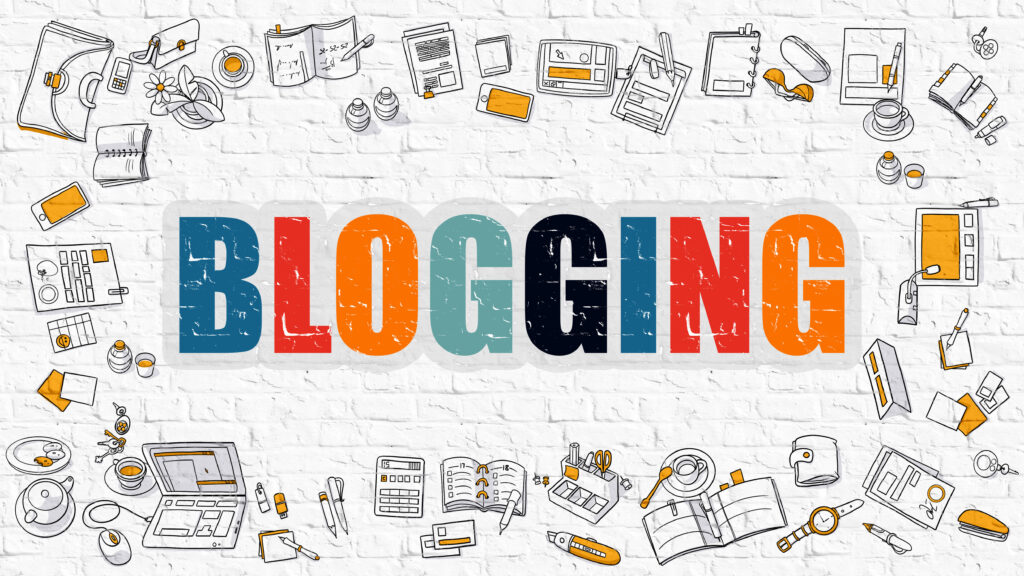
Blogging Concept. Modern Line Style Illustration. Multicolor Blogging Drawn on White Brick Wall. Doodle Icons. Doodle Design Style of Blogging Concept.
Introduction
A blog is defined by the dictionary as “a website that contains a writer’s or group of writers’ personal experiences, observations, opinions, etc., and frequently has photographs and connections to other websites.”
A person who frequently adds new information to this website is referred to as a blogger. A blog expresses the author’s opinions and views and is an independent source of information.
Revenue Sources for Bloggers
A blogger can make money from their site through a variety of channels. Among them are:
The most typical way for a blogger to make money is through adverts. The blog turns into a platform for promoting a business’s goods or services. Google AdSense, one of the most well-known ad networks, offers favourable advantages to among the most well-known ad networks Bloggers who offer their ad spaces for sale with Google AdSense receive substantial rewards; they are paid each time a reader hits one of the advertisements.
Affiliate sales – In this case, the blogger connects to goods or services on the blog that are associated with those goods and services. The blogger is compensated if a reader clicks on one of the links and makes a purchase.
Compensated review: Businesses may directly contact well-known bloggers and ask for a paid review. The blogger posts the review and receives payment.
Other – Other sources include freelance work, SEO services, content services, blog consulting, and blog design.
Tax Repercussions
It should be clear that blogging revenue cannot simply be categorised within the five heads of income listed in the Income Tax Act. The money should be categorised under Income from Business or Profession according to the nature of the activity, and will be handled as such.
Income From A Job Or Business
According to this section of the Income Tax Act, the taxpayer is required to remit taxes on the net income after deducting all necessary expenses and paying taxes on the income in the profit and loss account.
Permitted Expenses
Certain expenses are allowed because blogging income will be taxed as business income. Only the income after deducting these costs from the total revenue will be considered.
Only the income after deducting expenses will be subject to taxation. These costs will be subtracted from the overall revenue. The permitted costs are:
- Hosting fees for domains.
- Cost of renting.
- utility costs, including those for the phone and power.
- Pay for employees.
- compensation for independent consultants.
- Consolation fees.
- any additional fees paid with the intent of making money.
It is crucial to remember that the authorised costs must be incurred in order to generate income. The business’s ability to generate income must be promoted or made easier by the expenses incurred. The blogger is required to keep the bills and receipts as legal evidence of the costs incurred.
Depreciation
The blogger purchases resources that are required for the operation of his work, just like any business would. A portion of the cost of an asset purchase, such as a laptop, piece of furniture, or piece of office equipment, cannot be deducted in the year of the purchase. The price of the assets must be spread out during their lifetime. Depreciation is the phrase used to describe the distribution of an asset’s cost throughout its lifespan. Depreciation is another permissible item that the blogger may deduct from his earnings to determine Net Income.
Investments
By investing the revenues in certain investments like mutual funds, LIC policies, and PPF, the blogger can also reduce their tax burden. According to section 80C of the Income Tax Act, the investments are deductible.
Important Points
- The income tax must be paid for the income earned in the same year; hence the blogger will be required to pay the tax in instalments if it exceeds the threshold limits. This is known as Advance Tax.
- The Advance Tax must be paid within the due dates.
- The blogger must file the income tax return within the time specified and pay the balance tax or claim refund.
- The delay in the payment of income taxes will attract penalties and interest.
- The blogger will need a Permanent Account Number (PAN) for the filing of the income tax returns.
- The income tax provisions applicable to bloggers with respect to the blogging income is comparable to a business owner receiving business income.
0 Comments